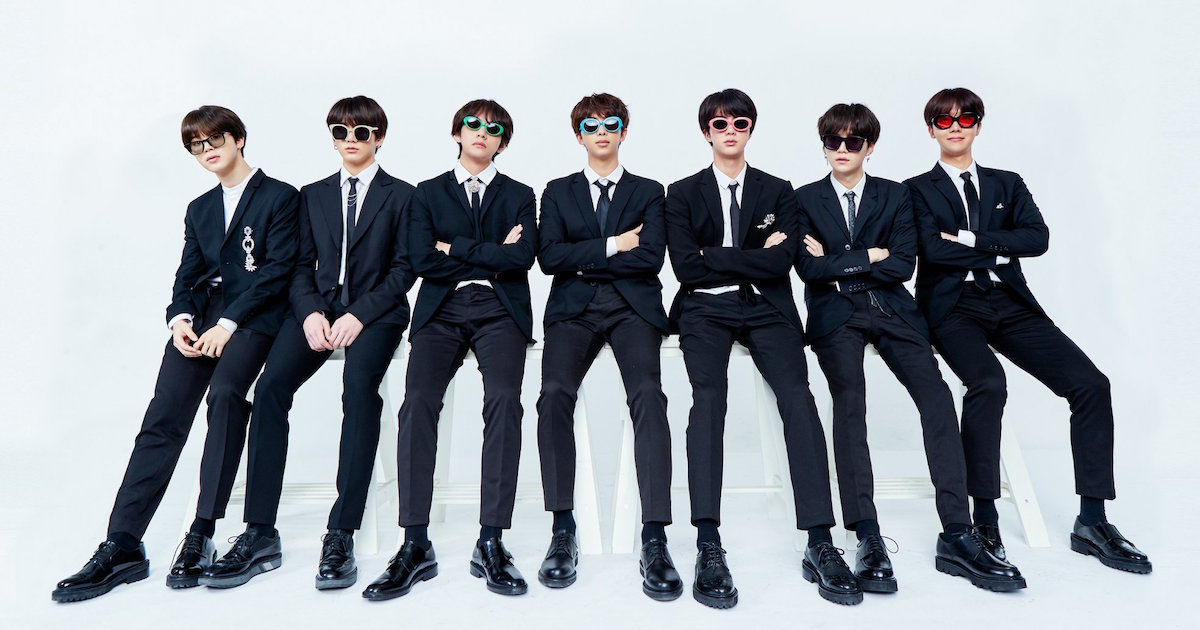This piece was created in response to/as the award for the success of BTS ARMY in the 2021 Affinity Mayhem competition on Twitter.
BTS is inarguably the biggest band on the planet right now, and their fan group is one of the most well organized and dominant fan organizations to date. The Adorable Representative M.C. for Youth (ARMY) can mobilize like no other. BTS is a musical, political and financial force changing the landscape of what it means to be a band in the twenty-first century.
BTS debuted in 2013, using a schoolboy persona and a focus on breaking rules to be yourself. The group is composed of J-Hope, Jimin Jin, Jungkook, RM, Suga and V. While many listeners know them for their tracks like “Dynamite,” BTS does not exclusively drop pop or EDM tracks like “I’m Fine.” Their lead-off song, “Intro: 2 Cool 4 School,” was a heavy hip hop song (though the group consciously no longer appropriates Black culture as they specifically did during this era). BTS has also delved into R&B music with songs like “House of Cards” and “Stigma.” Their music pushes bounds for lyricism and style, giving the group room to explore their talents and fans the opportunity to support them in numerous fields. The group has amassed 363 awards out of 541 (that’s a success rate of almost 67%). They write their own music and each contribute in their own ways, with a deep love for the actual process of crafting musical projects. RM, for example, is a masterful lyricist and V plays the saxophone, violin and piano. They also perform in both Korean and English, and they’re smashing records on international charts, something that was previously thought to be implausible due to so many listeners close minded or racist attitudes towards non-English media. While the group does come from a seriously powerful label, the members are critical and motivated artists independently, reaching into a number of fields.
BTS has made political waves, albeit inadvertently. The group has explicitly stated that they are not political, but when you are the largest band in the world, personal opinions and moral stances can leave a mark. Their music has touched on politicized themes relating to splintering from previous generations, creating your own path and even privilege. Their youthfulness and message hit the country and world’s generation gap on the head, resonating with listeners. On their 2016 song “Am I Wrong,” RM even raps, “If what you see on the news is nothing to you…If that hatred is nothing to you/You’re not normal, you’re abnormal.” The album came out just a year before Cultural Minister Cho Yoon-sun was removed and being investigated, while President Park Geun-hye was removed from office before being sentenced to prison. The South Korean government oversees the nation’s music industry in the same way many countries influence/intervene in markets such as stock trade. BTS has so much power that they influenced a law passed by the National Assembly, granting military enlistment deferrals to top athletes, artists, performers and now, K-Pop artists. In 2019, BTS even drew international criticism for becoming the first non-Arab artists to play a solo stadium show in the Saudi Arabia. They played in the Kingdom’s capital city of Riyadh per the exclusive request of Crown Prince Mohammed Bin Salman to President Moon Jae-in. This concert came after South Korea signed a $8.3 billion deal with Saudi Arabia. This connection sparked the interest of some fans and critics, who pointed to the political/human rights state of the Kingdom. The mere fact the group could break such a performance barrier and even be speculated to be a bargaining chip, demonstrates the extreme influence BTS has the power to wield.
“우리는 인종차별에 반대합니다. 우리는 폭력에 반대합니다. 나, 당신, 우리 모두는 존중받을 권리가 있습니다. 함께 하겠습니다. We stand against racial discrimination. We condemn violence. You, I and we all have the right to be respected. We will stand together. #BlackLivesMatter,” the group tweeted in June of 2020. While many celebrities were concerned about the optics of plainly stating that Black lives unequivocally have value and matter, BTS did not mince words. Additionally, the group donated $1 million dollars towards the Black Lives Matter organization. Suga explained to CNN, “Ours are initiatives that any person who wishes to live in a just world would want to pursue. We aren’t trying to send out some grandiose message…It’s about us being against racism and violence. Most people would be against these things.”
우리는 인종차별에 반대합니다.
우리는 폭력에 반대합니다.
나, 당신, 우리 모두는 존중받을 권리가 있습니다. 함께 하겠습니다.We stand against racial discrimination.
We condemn violence.
You, I and we all have the right to be respected. We will stand together.#BlackLivesMatter— 방탄소년단 (@BTS_twt) June 4, 2020
All seven members were invited to speak at the 75th session of the UN General Assembly, where they promoted a message of hope for UNICEF. They each shared heartfelt messages, speaking to ambassadors about what many people are currently experiencing in the context of their own careers and lives. Suga spoke, “Life became simple, maybe for the first time. It was a precious time, unwanted but welcome. I’m used to an entire world shrinking in an instant. When I’m on tour, I stand in bright lights and loud cheers, but at night back in my room my world becomes only a few paces wide…” Many members of their ARMY see the seven members of the group as their voices on a global stage, promoting mental health awareness and self-love through the concepts of their albums and even through their personal openness, such as August D’s (Suga) “The Last” track. BTS’ focus on mental health is personal to the members and the fans, but a by-product of this message is an additional political element. South Korea has very high rates of mental illness and an intense stigma surrounding the subject. Park JI and Jeon M published a study through the Journal of Korean Neuropsychiatric Association, “The Stigma of Mental Illness in Korea,” in which they stated, “mental health stigma acts as a barrier to mental health service utilization,” and that South Korea has fewer anti-stigma campaigns than other countries. A great deal of BTS’ fans are young adults and teenagers, a demographic vastly experiencing depression and anxiety globally. By having message that directly reaches out to people and tackles a topic that is so commonly swept off into the shadows, BTS is pivoting the conversation to an urgent social cause.
BTS holds the Guinness World Records for the most viewed YouTube video in 24 hours (they recently broke this again), “most viewers for a music concert live stream” and South Korea’s best selling album. They also shattered a grand total of five Guinness World Records with the release of “Butter” alone. BTS broke the record for the “most viewed YouTube music video in 24 hours,” the “most viewers for the premiere of a music video on YouTube,” the record for the
“most viewed YouTube music video in 24 hours by a K-pop group,” the “most streamed track on Spotify in the first 24 hours” and the record for the most streamed group on Spotify. These numbers translate into dollar signs. Their management group, Big Hit Music, is now a publicly traded company. Big Hit was initially valued at roughly $4 billion, as people jumped to get a piece of the newly-minted financial giant, thanks to the appeal of BTS’ ARMY. This pushed South Korea’s “Big Three” K-pop companies out of the top exchange slots. BTS actually has a rare sense of ownership, possessing $108 million in shares ($15.4 million or 68,385 shares from the CEO going to each of the seven members). It’s rare that artists own such a stake, and it’s setting the pace for many other big names in the industry right now. BTS is considerably the largest asset for Big Hit, and their ownership demonstrates the leverage they have over the situation. Thanks to BTS, the perception of Big Hit as a business entity and management organization has been fully remodeled.
So much of BTS’ power is fan driven — encouragement to speak out, financial support to social justice causes, the desire to see BTS perform around the world and the organization and strategy strong enough to entice people to invest in the group’s corporation all come from these fans. There are assumed to be roughly 40 million ARMY members (for comparison, the actual South Korean army has 3,305,000 members, the U.S. military has a total of 1,400,000 and China has the largest in the world at 2,190,000). BTS’ ARMY members are as passionate and dedicated as the members of the band. They mobilize for social justice, to spread the group’s music on an international stage and to combat the xenophobia the members often face. ARMYs support each other emotionally, learn choreography, buy merchandise, plan events and organize for social causes. For example, ARMYs raised 2 million rupees for COVID relief in India in April of 2021, and they worked to crash police apps with fancams during the height of the Black Lives Matter protests. Without the zealous support of millions of fans who work with each other to promote BTS like it’s their job, the group would likely have reached icon status and reshaped the world and business of music to this extent. The talent of BTS and the intensity of their ARMY has propelled K-pop as a whole to a new level around the world, because these fans genuinely and ardently care about the members and their music. In the same way BTS is rewriting the rules for bands and artists today, ARMYs are redefining what it means to be a member of a fan community. Teen girls are rarely allowed to like music and care about things without criticism, and the assessment of ARMYs has not been free from this scrutiny. However BTS is not just the fascination of teenage girls around the world who like them only for their looks, which is an assumption rooted in sexism, rather they’re a key part of numerous industries. These are dedicated fans who take the group’s message of self-love to heart.
BTS transcends the mediums of K-pop and mainstream Western pop. One can no longer discuss how BTS defies expectations for the game — BTS is the standard.
Feature image via Nolala













